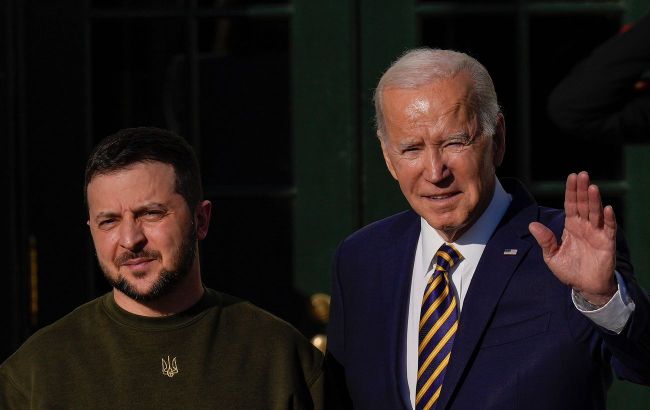Hostage to Trump: Unraveling reasons behind U.S. aid stall for Ukraine
 President of Ukraine Volodymyr Zelenskyy and President of the United States Joe Biden (Photo: Getty Images)
President of Ukraine Volodymyr Zelenskyy and President of the United States Joe Biden (Photo: Getty Images)
Explore the detailed account of why the allocation of American aid to Ukraine faced the threat of disruption and how Ukraine's support became entangled in Donald Trump's pre-election strategy and more in RBC-Ukraine's material.
Materials from Politico, The Hill, The Washington Post, and CNN were used in the preparation of the article.
At the end of last year, a number of interlocutors of RBC-Ukraine in the government expressed confident optimism about unlocking American aid to Ukraine, around the beginning of 2024. For a long time, it seemed that there was every reason for this: American Democrats and Republicans, albeit slowly, were progressing towards an agreement on migration issues and strengthening the U.S.-Mexico border – precisely this was voiced by Republicans as a condition for voting for the multibillion-dollar aid package to Ukraine (as well as to Israel and Taiwan).
However, recent events indicate that the deal may fall apart. As a result, the prospects for providing American aid to Ukraine are once again in complete uncertainty. The simple reason is the presidential elections in the United States, of which Ukraine has already become a hostage.
Migration deadlock
During closed consultations that lasted for several weeks between Republicans, Democrats, and the White House administration, a compromise on migration reform was gradually reached. Democrats were ready for some concessions, as even part of their voters and establishment recognized that reform was necessary – the flow of migrants at the southern border of the United States exceeded all reasonable limits, and this problem needed to be addressed.
At the same time, the actions of the Democrats could not be too significant, as a significant portion of Democrats fundamentally oppose any anti-immigration measures. Balancing between these positions led to the negotiations lasting so long. In Washington, meanwhile, it was recognized that there were no funds for further aid packages to Ukraine.
The situation was further complicated by the fact that the other side of the negotiations – Republicans, who demand tough anti-immigration measures – does not have a clear and unified approach to the problem. The migration crisis once again highlighted the deep divide within the Republican Party, between old-school principled Republicans who are constructive – and populists from the Trumpist wing who operate on the principle of "the worse, the better."
Indeed, Senate Minority Leader, veteran of American politics Mitch McConnell, who takes a decidedly pro-Ukrainian position, advocates for the rapid adoption of migration reform and, accordingly, unblocking aid to Ukraine.
At the same time, the hyperactive group of Trumpist Republicans in the House of Representatives is already directly talking about the need to break any deals in the interests of Donald Trump's victory in the upcoming presidential elections. "I'm not willing to do too damn much right now to help a Democrat and to help Joe Biden's approval rating," Republican Rep. Troy Nehls of Texas told CNN.
The political logic of such an approach is obvious: if the problem with migrants and the border is really resolved now, Trump's headquarters will lose the main theme on which he builds his election campaign.
What's worse, Speaker of the House Mike Johnson, who has been trying to maneuver between radical and moderate Republicans in his faction, also leans towards such an approach. Johnson insists on the approval of the Republican bill H.R. 2, which was passed by the House of Representatives last May but got stuck in the Democrat-controlled Senate with no chance of approval.

Speaker of the House Mike Johnson (Photo: Getty Images)
H.R.2 envisions a return to the harsh anti-immigration measures of the Donald Trump presidency, including the construction of an additional 900 miles of wall on the border with Mexico, making it more difficult for migrants to obtain temporary asylum while their case is being considered in court, and so on.
For Democrats, such measures are categorically unacceptable. What's worse for Ukraine, they are not ready to support them, even if Johnson brings a bill to the floor that combines the provisions of H.R.2 with providing aid to Ukraine.
Conflict of priorities
Thus, providing aid to Ukraine is entirely dependent on domestic American political disputes at various levels. In addition to the global confrontation along Republican/Democrat and Trump/Biden lines, there is also an internal struggle within the Republican Party in the House of Representatives, at the center of which is Speaker Johnson.
In addition to resolving the migration issue, he now has to deal with the threat of a government shutdown – the cessation of funding for the U.S. government. Recall that Congress has not been able to approve the country's budget for the current fiscal year, resorting only to temporary measures, the deadlines for which expire on January 19 and February 2 for different parts of the government apparatus.
As a compromise, Johnson agreed with Democrats on another temporary budget that pushed the shutdown to March 1 and 8. However, this decision has sharply criticized Trumpist Republicans. They generally seek to achieve a shutdown, hoping that chaos in government administration will damage Biden's ratings, and they also demand tying the budget approval to the same harsh anti-immigration measures.
Threats of resignation have already been openly voiced against Johnson by Trumpists if he compromises with Democrats. Last year, the conflict with radical Trumpists cost Johnson's predecessor, Kevin McCarthy, the speakership.
Even moderate Republican congressmen openly speak about their political priorities. "We have two possible leverage points to get border security: our own budget, or Ukraine aid. You’d rather hold hostage our own troops’ pay? Or hold hostage Ukraine aid?" said Republican Dan Crenshaw in a comment to Politico.
Thus, as of now, the resolution of the migration problem in the U.S., and consequently, the allocation of American aid to Ukraine, is entering a deadlock. The situation is further complicated by Trump's overconfident victory in the first Republican primaries in Iowa, making him the uncontested candidate for the party in the presidential elections and giving confidence to his supporters in the American establishment.

